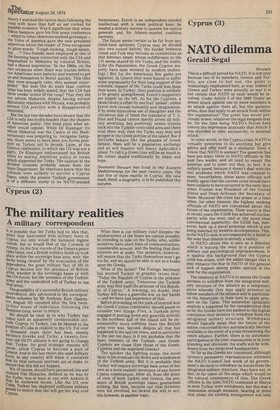The military realities
A military correspondent
It is possible that the Turks had no idea that, When they intervened with military force in Cyprus, not only would the Sampson regime vanish, but so would that of the Colonels in Athens. As the first rounds of the Geneva peace talks failed, and a British military build-up took Place within the sovereign base area, with 'the decks being cleared' by the evacuation of the ,.,dePendents, the great military fact of life in Cyprus became not the presence of British arms, whether in the sovereign bases or with the UN forces, but the presence of the Turkish army and the undoubted will of Turkey to use that army. The possilpility Of a successful British military intervdntion, ably advocated in the correspondence columns by Mr Anthony Kerr (Spectator, August 10) vanished after the first twentY-four hours of indecision following the Sampson coup, never to return.
We should be clear as to why Turkey has taken such an apparently unreasonable attitude. Cyprus, to Turkey, can be likened to the Position of Cuba in relation to the US. For over a thousand years there has been enmity between Greeks and Turks; a twenty-fiveYear-old NATO alliance is not going to change that. Turkey, for good strategic reasons will never,; allow Cyprus to become a part of Greece. And in the last resort she used military force, as any country will when it conceives that its vital national interests are at stake, to ensure that this did not happen. We, of course, should have perceived this and realised that Makarios, disliked as he was by the Turks, was at least at one with Ankara in that he eschewed enosis. Like the US over Cuba, Turkey has deployed sufficient military Power to ensure that she will get her way over CYprus. What then is our military role? Despite the reinforcement of the bases we cannot possibly be intending to take on the Turks, who, unlike ourselves, have short lines of communications, considerable armour, and the feeling that their interests are at stake. Our presence, however, will ensure that the Turks themselves won't go too far, and we should be able to act as a brake upon the Greeks.
What of the future? The Foreign Secretary has warned Turkey in graphic terms that: "Today the Republic of Cyprus is the prisoner of the Turkish army, Tomorrow the Turkish army may find itself the prisoner of the Republic of Cyprus." A warning, no doubt, that Turkey will have a guerrilla war on her hands — and we have had experience of that.
Before proceeding on the path of internal war the Greek-Cypriot community should pause to consider two things. First, a Turkish army engaged in putting down any guerrilla activity in the northern half of the island will be immeasurably more ruthless than the British army ever was. Second, despite all that has happened in the last ten years, and in particular in the last ten days, is it not probable that the basic interests of the Turkishand GreekCypriots are closer than those of the GreekCypriots and the mainland Greeks?
The quicker the fighting stops, the more likely is the eventual run-down and withdrawal of the Turkish army. But it is probable that Turkey will require sovereign base areas of her own as a more realistic insurance of any future Cyprus constitutuon. After all, from the point of view of both Turkey and Greece, the presence of British sovereign bases guaranteed nothing. But then, because our vital interests were not involved, we lacked the will to act; this however, is another topic.


































 Previous page
Previous page